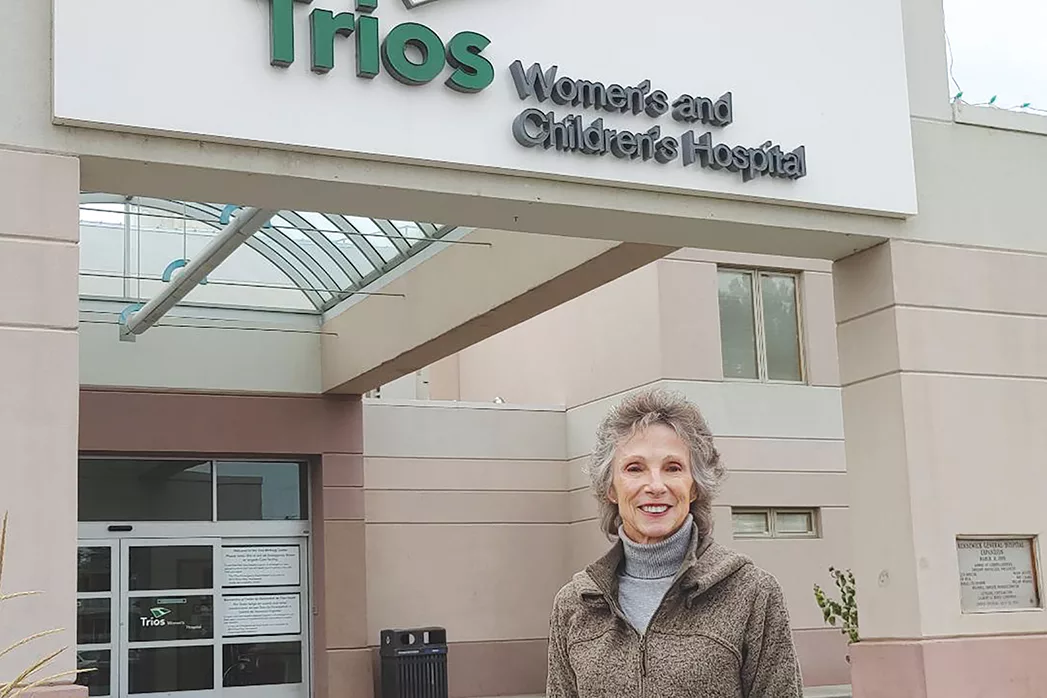
Home » Old Kennewick hospital eyed for mental health, addiction center
Old Kennewick hospital eyed for mental health, addiction center

October 14, 2020
The Tri-Cities — Washington’s only metro without a detox and drug rehabilitation facility — could see a 1950s-era hospital in the heart of Kennewick renovated to meet the growing need for local services.
The former Kennewick General Hospital, currently used a birthing center by Trios Health, will become the Two Rivers Rehabilitation Center under a plan set in motion more than two years ago and now gaining momentum.
The Kennewick Public Hospital District board will review a feasibility study at its next meeting, which will be held by Zoom on Oct. 29.
The two-part study sets the stage for the hospital district to reacquire a property it once owned and transform it into a 76-bed detoxification and residential treatment facility offering drug treatment and mental health services.
The study is a joint venture with Benton and Franklin counties, in partnership with the nonprofit Benton Franklin Recovery Coalition. The district’s board will vote to accept the study, which has not been released. It will be shared with its county partners and the public at that time.
“If we can pull this off, it will be a fantastic purpose for the hospital district,” said Gary Long, president of the hospital district board.
Coming full circle
Reacquiring the former KGH would bring the public hospital district back to its roots.
It owned and operated the hospital on Auburn Street for generations before it built Trios Southridge Hospital in western Kennewick. Most functions shifted to Southridge, but Trios Family Birthing Center remained at Auburn Street.
In 2017, saddled with more than $200 million in debt, the district sought relief from creditors by filing under Chapter 9 of the U.S. Bankruptcy Code, the chapter that allows insolvent municipalities to reorganize.
The district emerged from bankruptcy the following year after a predecessor of LifePoint Health, a for-profit health care system, bought the district’s assets, including both hospitals. Trios and its new parent, LifePoint, want to move the birthing center to Southridge.
If they succeed, it will leave a 100,000-square-foot hospital vacant in downtown Kennewick.
That opens the door to the hospital district to buy it back. The old hospital would serve its reorganized mission to fill gaps in local health care services.
“This is our major effort right now,” Long said. The Covid-19 pandemic has only worsened the crisis in opioid addiction and mental health.
“The need has grown exponentially,” he said. The center would provide a 60-bed residential treatment center and a 16-bed detox center, with some beds held in secured areas for inmates brought in by law enforcement.
Aligning the stars
Lee Kerr, superintendent of the hospital district, said it has an unofficial agreement to buy back the old hospital from LifePoint on “favorable” terms. The property is valued at $5.4 million for tax purposes, but the sale price would reportedly be for a much lower sum.
Trios declined to elaborate on its plans for its birthing center and the old KGH building. It released a statement affirming its commitment to quality care and referred questions to the hospital district.
However, the organization filed a certificate of need application with the Washington Department of Health, seeking approval to consolidate its acute care beds at Southridge. A decision is expected in January, said Gordon MacCracken, a DOH spokesman.
It could take two years to move the birthing center. To advocates for a recovery center, a hospital with no occupants is an answer to their dreams.
“It’s a hospital. It’s got everything you could possibly need,” Kerr said.
Recovery coalition efforts
The Benton Franklin Recovery Coalition, known as the 509 Recovery Coalition, has scouted the community for a spot.
The nonprofit advocacy group is led by Michele Gerber and counts the sheriffs of Benton and Franklin counties as board members, along with Dr. Amy Person, public health officer for the bicounty health district.
The coalition spent two years pleading the case for a local recovery center to city councils, county commissioners, Rotarians, Kiwanians, the Columbia Basin Badgers and many more.
Gerber focuses on two key points: Substance abuse disorder is an illness, not a moral failing, and treating people at home is a good financial move for the Tri-Cities that will pay dividends in improved services and reduced crime.
The two county commissions shared half the cost of the $50,000 feasibility study, paying $12,500 apiece. The hospital district supported the rest.
She is encouraged by the feedback.
“I haven’t had one person in an audience say, ‘You’re wrong. These people caused their own problems and don’t deserve help.’ No one says that,” said Gerber, whose son died after becoming addicted to painkillers following an accident as a young adult.
How it would work
Accepting a feasibility study is the first in a long series of steps, said Long, of the hospital district board.
Next, the state must approve Trios’ request to consolidate beds at Southridge.
Trios and its parent have not shared their plans publicly. Building a new birthing center near the emergency room is the one idea that is reportedly being discussed.
The public hospital district and Trios also must agree to a building sale.
Kerr said the health district will use money the Tri-Cities Cancer Center paid to buy out two of its former owners to fund the down payment on the old hospital. It received $325,000 from the cancer center, as did Lourdes, which is also owned by LifePoint.
Lourdes has reportedly committed its share to the project but did not confirm it directly.
Readying the facility
The recovery center needs a license from the state health department. An inspector toured the old hospital building in July 2019 and told supporters what would be needed to secure a license.
MacCracken, of the state health department, said no formal plans were submitted at the time. There have been follow-up discussions with an architect who worked on the feasibility study.
The district believes the state views the plan with a favorable eye.
The feasibility study shows the hospital will require $6 million in renovations to qualify as a residential recovery center, Kerr said.
The state capital projects budget is one potential source of funds. The hospital district also would seek donations and grants and launch a capital campaign.
If the hospital district buys the hospital, it will not run it. It would function as a landlord, much the way shopping mall owners supply facilities and operating standards but do not run actual stores.
Kerr said the hospital could be home to local, regional and national organizations. Amenities would include an emergency assessment area for patients who arrive on their own, are brought in by loved ones or even by police.
“If you build it, they will come,” he said, citing the popular line from the movie “Field of Dreams.”
Service providers would be paid by Medicaid, Medicare, private insurance and private pay.
Good for business?
The recovery center would not compete with existing services. Supporters are particularly sensitive to the Lourdes Counseling Center in Richland, known as “Carondelet.”
Gerber said the new center will not compete for patients. There are enough to go around, she said.
Without sufficient treatment and recovery services, Tri-Citians must leave the area to get help.
That is bad for patients and bad for the local economy, Gerber said.
It is bad for patients who may have to wait to get into treatment, causing them to miss the “window of opportunity” when they are most willing to seek help, such as after an overdose or arrest. Distant programs isolate patients from their support networks as well.
Treating issues reduces the load on local law enforcement, jails and emergency rooms. Delaying it does not.
“If you treat, maybe they won’t be back,” she said.
It is bad for businesses as well. Not only do employers have to send employees out of town, the money follows them.
Treatment is big business. Gerber cited, with permission, the experience of a friend who works for Battelle whose daughter has been treated multiple times in the span of two years, at a cost of about $300,000.
“These are incredible amounts of money leaving our community,” she said. A proper residential center would attract doctors and counselors to an area that has a shortage of both, to the benefit of all Tri-Citians.
“All of us would have more services,” she said.
Stay in the loop
Details about joining the hospital district’s Oct. 29 board meeting will be posted at kenkphd.com/meetings
Follow the Benton Franklin Recovery Coalition at 509recovery.org.
Local News
KEYWORDS october 2020





